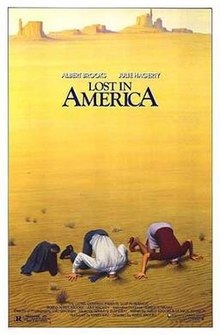Lost in America
| Lost in America | |
|---|---|
 Theatrical release poster | |
| Directed by | Albert Brooks |
| Written by | Albert Brooks Monica Johnson |
| Produced by | Marty Katz |
| Starring |
|
| Cinematography | Eric Saarinen |
| Edited by | David Finfer |
| Music by | Arthur B. Rubinstein |
Production company | |
| Distributed by | Warner Bros. |
Release date |
|
Running time | 91 minutes |
| Country | United States |
| Language | English |
| Box office | $10,179,000 |
Lost in America is a 1985 satirical road comedy film directed by Albert Brooks and co-written by Brooks with Monica Johnson. The film stars Brooks alongside Julie Hagerty as a married couple who decide to quit their jobs and travel across America.
Plot
David and Linda Howard are typical 1980s yuppies in California who are fed up with their lifestyle. He works in an advertising agency and she for a department store. But after he fails to receive a promotion he was counting on and is instead asked to transfer to the firm's New York office, David angrily insults his boss and is fired. He coaxes his wife to quit her job as well and seek a new adventure.
The Howards decide to sell their house, liquidate their assets, drop out of society, "like in Easy Rider", and travel the country in a Winnebago recreational vehicle. They leave L.A. with a "nest egg" of a hundred thousand dollars but do not get very far. The plan goes awry when Linda loses all their savings playing roulette at the Desert Inn Casino in Las Vegas, where a desperate David tries in vain to persuade a casino manager to give the money back as a publicity gimmick.
With nowhere to go, the couple quarrels at Hoover Dam, then ends up in Safford, Arizona. David unsuccessfully applies for a delivery job at a local pharmacy and resorts to an employment agency. After a counselor obnoxiously reminds him that he was fired from his high-paying job in advertising, David accepts the best position available — as a crossing guard, taunted by local school kids.
Linda, meanwhile, finds employment as the assistant manager at the local Der Wienerschnitzel, working under a kid half her age.
Only a few days after beginning their pursuit of the dream of dropping out of society, David and Linda are living in a trailer park, almost broke, working dead-end jobs where they are accountable to brats. They decide that it is better to get back to their old lifestyle as soon as possible. They point the Winnebago toward New York, where David begs for his old job back. An end card reveals he is rehired with a substantial pay cut but better dental care.
Cast
- Albert Brooks as David Howard
- Julie Hagerty as Linda Howard
- Maggie Roswell as Patty
- Michael Greene as Paul Dunn
- Garry Marshall as Casino Manager
- Donald Gibb as Ex-Convict
- Charles Boswell as Highway Patrolman
Brooks originally did not want to direct himself and had wanted Bill Murray for the part of David Howard.[1]
Reception and awards
Lost In America received mostly positive reviews from critics and holds a 97% rating on review aggregator Rotten Tomatoes, based on 32 reviews, with the consensus; "A satire of the American fantasy of leaving it all behind, Lost in America features some of Albert Brooks' best, most consistent writing and cultural jabs."[2] The film was a commercial success, though not a blockbuster. The film's script won the National Society of Film Critics award for Best Screenplay.
The film is #80 on Bravo's "100 Funniest Movies",[citation needed] and was listed at #84 on American Film Institute's "AFI's 100 Years...100 Laughs" in 2000.[3]
Home media
Warner Home Video initially released the film on Betamax, VHS, and Laserdisc in 1985 and reissued it twice on video, in 1991 and 1997. The film made its DVD debut on April 3, 2001, and was made available for streaming on Netflix on July 1, 2016. Criterion released the Blu-ray on July 25, 2017.
References
- ^ Brownfield, Paul (26 August 1999). "The Muse of Albert". Los Angeles Times. Retrieved 10 August 2015.
- ^ "Lost in America". www.rottentomatoes.com. Retrieved 25 April 2018.
- ^ "AFI's 100 Years...100 Laughs" (PDF). American Film Institute. Retrieved 21 August 2016.
External links
- Lost in America at IMDb
- Lost in America at Rotten Tomatoes
- Lost in America at Box Office Mojo
- Lost in America: The $100,000 Box an essay by Scott Tobias at the Criterion Collection
- 1985 films
- American comedy road movies
- American films
- English-language films
- 1980s comedy road movies
- Films directed by Albert Brooks
- Films set in the Las Vegas Valley
- Films set in Los Angeles
- Films set in New York City
- Gambling films
- The Geffen Film Company films
- Films with screenplays by Albert Brooks
- Films with screenplays by Monica Johnson
- Films scored by Arthur B. Rubinstein
- 1985 comedy films
